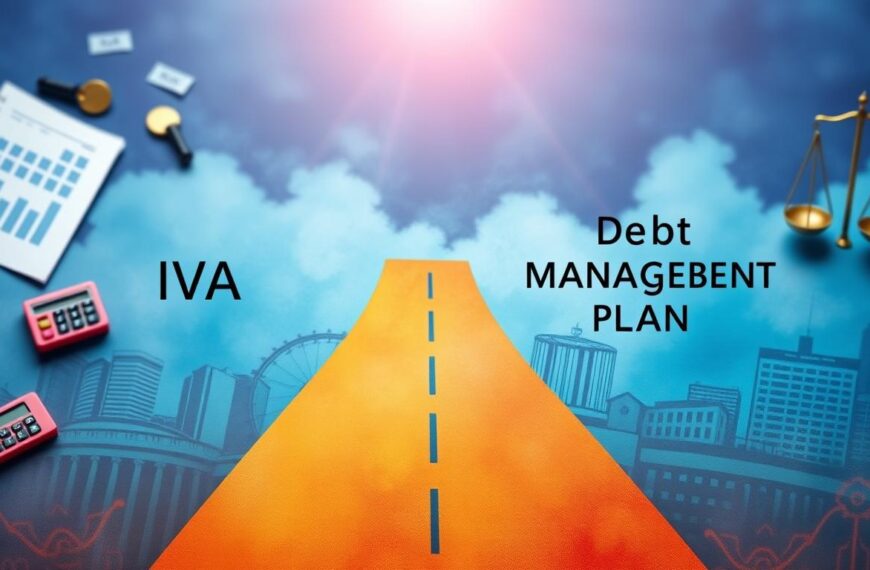Facing bailiffs can be an overwhelming experience, often causing significant stress and anxiety. These authorised agents are empowered to collect outstanding amounts on behalf of creditors, which may include unpaid Council Tax bills, parking fines, or court judgments1. Their involvement can escalate financial pressures, making it essential to explore effective solutions.
One potential strategy is a Debt Management Plan (DMP). This informal agreement allows individuals to structure repayments over time, offering a manageable alternative to lump-sum payments. While creditors are not legally bound to accept reduced payments or freeze interest, many appreciate the commitment to repayment1.
This article delves into whether a DMP can halt bailiff action and how it safeguards your assets. We’ll also examine the legal powers of bailiffs, the workings of DMPs, and the importance of negotiating with creditors. Stay informed and take proactive steps to protect your financial well-being.
Understanding Bailiffs and Their Legal Powers
Bailiffs are authorised agents who enforce court judgments to recover outstanding amounts. They operate independently, as part of a private firm, or are employed by a county court or local council2. Their role involves collecting debts such as County Court Judgments (CCJs), council tax arrears, and court fines2.
Who are Bailiffs?
Bailiffs, also known as enforcement agents, act on behalf of creditors to recover unpaid debts. They must provide a notice of enforcement at least seven days before visiting a property3. This letter outlines the details of the debt and the intended action, giving individuals time to respond or seek advice4.
Their powers come into effect only after a court judgment has been issued. This ensures that their actions are legally sanctioned and follow strict guidelines2. Understanding this process is essential for protecting your rights and exploring potential solutions.
When Do Their Powers Come Into Effect?
Bailiffs’ authority begins after a county court or magistrate’s court judgment. They cannot forcibly enter a property but may gain entry with permission2. Once inside, they can confiscate specific goods to recover the debt, though certain items are protected by law4.
Statutory rules also safeguard vulnerable individuals, preventing aggressive actions. For example, bailiffs cannot enter homes when only children under 16 are present or use physical force4. These protections ensure fair treatment during the enforcement process.
| Key Points | Details |
|---|---|
| Notice of Enforcement | Sent at least seven days before a visit3. |
| Legal Entry | Cannot forcibly enter but may gain permission2. |
| Protected Items | Essential goods, children’s belongings, and work tools4. |
Failure to address a “debt full” situation can escalate the process, leading to further action by creditors. It’s crucial to act promptly and seek professional advice to avoid complications. For more information on managing debt and bailiff involvement, visit this resource.
How Debt Management Plans Operate
Navigating financial difficulties often requires structured solutions to regain control. A Debt Management Plan (DMP) offers a practical approach to managing long-term obligations. It allows individuals to repay their debts gradually, providing relief from overwhelming financial pressures5.
What is a DMP?
A DMP is an informal arrangement designed to help individuals repay their debts over time. It involves making one affordable monthly payment, which is then distributed to creditors5. This approach simplifies repayments and reduces the stress of managing multiple accounts.
Unlike formal insolvency solutions, a DMP is not legally binding. However, it demonstrates a commitment to repay creditors, which can lead to more favourable terms6. Many people organise DMPs independently or with the help of dedicated providers.
Informal Agreement or Legally Binding?
A DMP operates as an informal agreement between the individual and their creditors. While it lacks legal enforceability, it often proves effective in negotiating reduced payments or freezing interest7. Creditors may appreciate the structured approach, leading to improved repayment terms.
Various management plans are available to suit different financial situations. Whether organised independently or through a provider, a DMP can provide a clear path to financial stability5.
Can a debt management plan stop bailiffs
Dealing with financial enforcement can feel daunting, especially when bailiffs are involved. While a debt management plan does not guarantee they will never visit, it often persuades creditors to hold off enforcement. This is because creditors recognise your commitment to repaying what you owe5.
Mechanisms to Protect Your Home and Assets
A DMP offers structured repayments, which can reassure creditors. By making regular, reduced payments, you demonstrate your ability to pay debt over time6. This approach might reduce the urgency for enforcement action, giving you breathing space.
Timely payment arrangements and clear communication are key. When creditors see a viable repayment strategy, they may delay or prevent bailiff intervention5. Showing that you are might able to meet your obligations can further strengthen your position.
Establishing a plan creditor agreement can also protect vital assets, including your home. Creditors often prefer structured solutions over enforcement, as it ensures they receive payments consistently6. Contacting a DMP provider can facilitate these negotiations, offering a clear path forward.
Advantages of Using a Debt Management Plan
Structured financial solutions can provide significant relief for those struggling with repayments. A Debt Management Plan (DMP) offers several benefits, making it a practical choice for many individuals. These advantages include reduced monthly obligations and the potential to freeze interest and additional charges8.

Reducing Monthly Obligations
One of the primary benefits of a DMP is the ability to lower monthly repayments. This makes the overall debt more manageable, allowing individuals to maintain essential living standards9. For example, some companies offer reduced payments starting from as little as £110 per month, easing financial pressure significantly.
Professional management of the plan often ensures creditors are more cooperative. This collaboration can lead to fairer terms, making repayments less burdensome over time8.
Freezing Interest and Additional Charges
Another key advantage is the potential to freeze interest and additional charges. This prevents the debt from increasing, providing a clearer path to repayment9. Creditors may agree to these terms when presented with a realistic income and expenditure report.
Seeking professional advice and help can ensure the terms remain fair throughout the repayment period. This support is invaluable in maintaining financial stability and avoiding further complications8.
For more information on how creditors may still contact you during a DMP, visit this resource.
Setting Up Affordable Repayment Arrangements
Establishing a structured repayment strategy can help alleviate financial stress and prevent enforcement actions. By carefully planning your finances, you can negotiate manageable terms with creditors and avoid escalating issues.
Creating a Realistic Budget
Start by calculating the amount you can afford to pay each month. Prepare a detailed budget sheet that outlines your income and essential outgoings. This step ensures you have a clear understanding of your financial situation.
When negotiating a repayment agreement, provide clear information and supporting documentation. Realistic planning helps avoid missed payment deadlines, which can lead to extra fees10.
Writing a proposal to creditors or bailiffs is essential. Include your proposed repayment terms and explain why the amount is realistic. Confirming any negotiated agreement in writing safeguards both parties11.
| Key Steps | Details |
|---|---|
| Calculate Affordability | Determine what you can pay monthly10. |
| Prepare Budget Sheet | Outline income and essential expenses11. |
| Negotiate Terms | Provide clear documentation and proposals12. |
Approximately 70% of repayment proposals are accepted when based on a well-structured budget10. Taking these steps ensures you stay in control of your finances and avoid further complications.
Dealing with Court Actions and Creditor Negotiations
Court judgements often mark a critical turning point in financial disputes, setting the stage for enforcement actions. Once a judgement is issued, creditors may escalate their efforts to recover outstanding amounts, leading to further legal steps13.
Understanding the implications of a court decision is essential. It not only validates the creditor’s claim but also provides them with legal authority to pursue repayment through various means10.
Understanding Court Judgements
A court judgement is a formal decision that confirms the existence of a debt and its amount. It often leads to the involvement of enforcement agents, who act on behalf of the creditor to recover the owed sum13.
In many cases, the county court handles these matters, especially for smaller claims. However, for larger amounts, the High Court may be involved, particularly if the debt exceeds £100,00013.
Once a judgement is issued, creditors can enforce it through a writ of control, allowing enforcement agents to take control of goods. They must provide seven days’ notice before visiting a property14.
Negotiating with Creditors
After a court decision, negotiating with creditors becomes crucial. Presenting a realistic repayment proposal can persuade them to delay or halt enforcement actions10.
Having the correct number of supporting documents strengthens your case. For instance, a detailed budget sheet and proof of income demonstrate your commitment to resolving the debt10.
Creditors may also consider a stay of execution if you can demonstrate your ability to make regular payments. This legal measure can temporarily prevent enforcement agents from acting13.
The Role of the County Court
The county court plays a pivotal role in debt recovery procedures. It ensures that enforcement actions are carried out within legal boundaries, protecting the rights of both creditors and debtors13.
Debtors can engage with the legal system by submitting specific forms, such as the N245 for county court debts. These forms allow for reassessment of repayment terms, offering a structured approach to resolving financial disputes10.
Understanding the process and your rights can significantly improve the outcome of creditor negotiations. Seeking professional advice is often advisable to navigate these complex procedures effectively14.
Accessing Professional Debt Advice and Support
Seeking professional guidance is often the first step towards resolving financial challenges effectively. When dealing with enforcement agents or overwhelming obligations, expert advice can provide clarity and practical solutions. Professional support ensures that every person receives tailored strategies to address their unique situation15.
When to Contact Citizens Advice
Citizens Advice offers free, impartial advice to individuals facing financial difficulties. This organisation provides expert guidance on managing repayments, negotiating with creditors, and understanding legal rights. Contacting them is particularly beneficial when dealing with complex problems or enforcement actions15.
Their website is a valuable resource, offering detailed information on debt solutions and rights. Whether you’re struggling with arrears or enforcement, Citizens Advice can help you navigate the process effectively15.
Working with a DMP Provider
Engaging a reputable company to manage your repayments can simplify the process significantly. These providers negotiate with creditors on your behalf, ensuring manageable terms and reducing stress. Many individuals find that professional help leads to more favourable outcomes15.
When choosing a company, ensure they are regulated and experienced. A trusted provider will address your problems efficiently, offering a structured path to financial stability. For more information on structured solutions, explore the differences between Individual Voluntary Arrangements (IVAs) and Debt Management Plans.
Conclusion
Managing financial challenges requires a structured approach. A Debt Management Plan offers a practical way to regain control, even if it doesn’t guarantee complete protection from enforcement. While informal, it provides a solid foundation for negotiating with creditors and reducing monthly obligations16.
Taking action in time can prevent further escalation, such as additional interest charges or the seizure of goods. This option allows individuals to focus on repayments without the immediate threat of enforcement17.
For those struggling, seeking professional advice is a sound reason to explore this way forward. A qualified lender or advisory service can provide tailored support, ensuring a smoother path to financial stability. Act promptly to address mounting obligations and explore all available resources.
FAQ
Who are bailiffs and what do they do?
Bailiffs are enforcement agents authorised to collect unpaid debts or seize goods on behalf of creditors. They act under specific legal powers granted by court orders or warrants.
When do bailiffs’ powers come into effect?
Their powers are activated when a creditor obtains a court judgement against you for unpaid debts. This allows them to take action to recover the owed amount.
What is a debt management plan (DMP)?
A DMP is an arrangement where you make reduced monthly payments towards your debts through a third-party provider. It helps manage repayments without formal legal agreements.
Is a DMP legally binding?
No, a DMP is an informal agreement between you and your creditors. While it’s not legally binding, most lenders accept it as a way to repay what you owe.
Can a DMP prevent bailiffs from visiting my home?
Yes, if your creditors agree to the plan, it can halt enforcement actions, including visits from bailiffs. However, this depends on their acceptance of the arrangement.
How does a DMP reduce monthly payments?
A DMP calculates affordable repayments based on your income and expenses. This ensures you pay a manageable amount each month while addressing your debts.
Does a DMP freeze interest and charges?
Some creditors may agree to freeze interest and additional charges, but this is not guaranteed. It’s essential to confirm this with each lender.
How do I create a realistic budget for a DMP?
Start by listing your income, essential expenses, and debts. A debt advisor can help you design a budget that ensures you can meet your repayment obligations.
What should I do if I receive a court judgement?
Contact your DMP provider or a debt advice organisation immediately. They can help negotiate with creditors or explore options to prevent further action.
When should I contact Citizens Advice?
Reach out to Citizens Advice if you’re struggling with debts, need help understanding your rights, or require support in setting up a DMP.
How do I choose a reliable DMP provider?
Look for providers authorised by the Financial Conduct Authority (FCA). Check reviews, fees, and the level of support they offer before making a decision.
Source Links
- https://mydebt-plan.co.uk/debt-solutions/can-a-debt-management-plan-stop-bailiffs/
- https://www.ivahelpline.co.uk/knowledge-hub/can-a-debt-management-plan-stop-bailiffs/
- https://www.pinsentmasons.com/out-law/guides/bailiffs-and-their-powers
- https://www.creditfix.co.uk/help-with-debt/debt-collection/bailiffs/
- https://www.payplan.com/debt-solutions/debt-management-plans/dmp-faqs/
- https://nationaldebtline.org/get-information/guides/debt-management-plans-ew/
- https://debtcamel.co.uk/debt-options/guide-to-dmps/
- https://www.bbc.com/news/business-13620288
- https://www.payplan.com/debt-solutions/debt-management-plans/questions/
- https://www.citizensadvice.org.uk/debt-and-money/action-your-creditor-can-take/bailiffs/stopping-bailiffs/negotiating-your-debt-with-bailiffs/
- https://capuk.org/get-help/cap-debt-help/debt-management-plan
- https://nationaldebtline.org/get-information/guides/refused-offers-ew/
- https://businessdebtline.org/fact-sheet-library/high-court-enforcement-ew/
- https://www.payplan.com/debt-info/collection-of-debts/dealing-with-bailiffs/
- https://england.shelter.org.uk/professional_resources/legal/debt/where_to_get_debt_and_money_advice
- https://www.payplan.com/debt-solutions/debt-management-plans/can-a-dmp-protect-your-assets/
- https://www.creditfix.co.uk/knowledge-hub/debt-management-plan-pros-and-cons/















